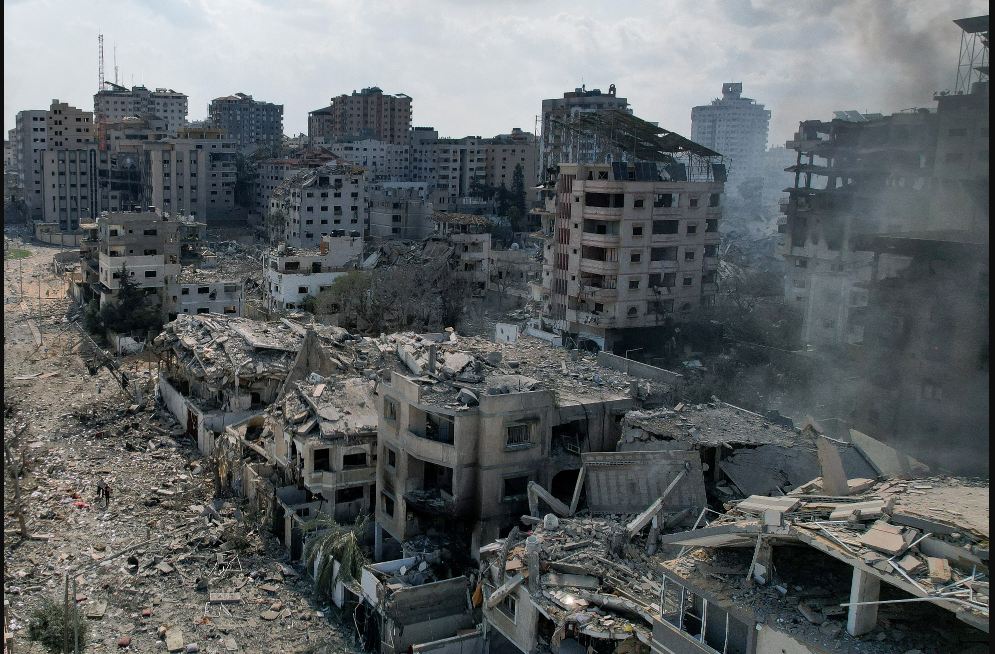Gathering its dead, Israel pounds Gaza with fiercest air strikes ever
Jerusalem/Gaza/Kfer Aza (Reuters) – Israel pounded the Gaza Strip on Tuesday with the fiercest air strikes in its 75-year conflict with the Palestinians, razing whole districts to dust despite a threat from Hamas militants to execute a captive for each home hit.
Across the barrier wall surrounding the strip, Israeli soldiers were collecting the last of the dead four days after Hamas gunmen rampaged through towns in by far the deadliest attack in Israel’s history.
Israel has vowed to take “mighty revenge”, calling up hundreds of thousands of reservists and placing Gaza, crowded home to 2.3 million people, under total siege.
Israel’s embassy in Washington said the death toll from Hamas’ weekend attacks had surpassed 1,000, dwarfing all modern Islamist attacks on the West bar 9/11.
The victims were overwhelmingly civilians, gunned down in homes, on streets or at a dance party. Scores of Israelis and some foreigners were captured and taken to Gaza as hostages, some paraded through the streets.
Gaza’s health ministry said Israel’s retaliatory strikes had killed at least 770 people and wounded more than 4,000. The air strikes, already the heaviest ever, intensified on Tuesday night, shaking the ground and pouring columns of smoke and flames into the morning sky.
The United Nations said more than 180,000 Gazans had been made homeless, many huddling on streets or in schools.
At the morgue in Gaza’s Khan Younis hospital, bodies were laid on the ground on stretchers with names written on their bellies. Medics called for relatives to pick up bodies quickly because there was no more space for the dead.
A municipal building was hit while being used as an emergency shelter; survivors there spoke of many dead.
“There is an extraordinary number of martyrs, people are still under the rubble, some friends are either martyrs or wounded,” said Ala Abu Tair, 35, who had sought shelter there with his family after fleeing Abassan Al-Kabira near the border. “No place is safe in Gaza, as you see they hit everywhere.”
Radwan Abu al-Kass, a boxing instructor and father of three, said he had been one of the last to evacuate his five-storey building in the Al Rimal district after the area came under attack. He finally left when a missile hit the building, which was destroyed by a bigger strike after he got out.
“The whole district was just erased,” he said.
Three Gaza journalists were killed when an Israeli missile hit a building while they were outside reporting, bringing the number of journalists killed to six.
U.N. High Commissioner for Human Rights Volker Turk, who denounced the Hamas attacks, said civilians had been harmed in Israeli strikes on tower blocks, schools and U.N. buildings.
“International humanitarian law is clear: the obligation to take constant care to spare the civilian population and civilian objects remains applicable throughout the attacks,” he said.
Trail Of Blood
In Israel, there has still been no complete official count of the dead and missing from Saturday’s attacks. In the southern town of Be’eri, where more than 100 bodies have been retrieved, volunteers in yellow vests and face masks solemnly carried the dead out of homes on stretchers.
A long, wide trail of blood wound along the floor of a house where bodies had been dragged out to the street from a bloodsoaked kitchen strewn with overturned furniture.
“The thing I want the most is to wake up from this nightmare,” said Elad Hakim, a survivor from a music festival where Hamas had killed 260 partygoers at dawn.
Amid the burned out houses of the Kfar Aza kibbutz, bodies of Israeli residents and Hamas militants lay on the ground beside strewn furniture and torched cars. Israeli soldiers went from house to house to take away the dead. The stench of corpses was heavy in the air.
“You see the babies, the mothers, the fathers, in their bedrooms, in their protection rooms and how the terrorist kills them. It’s not a war, it’s not a battlefield. It’s a massacre,” said Israeli Major General Itai Veruv, escorting journalists at the scene.
“It’s something that we used to imagine from our grandfathers, grandmothers in the pogrom in Europe and other places.”
Soldiers were still securing the paths of the kibbutz as bursts of gunfire and explosions could be heard in the distance. Jets could be heard above and smoke could be seen rising from Gaza. Sirens warned of incoming rockets intercepted overhead.
Israel’s next move could be a ground offensive into the Gaza Strip, territory it abandoned in 2005 and has kept under blockade since Hamas took power there in 2007. The total siege it announced on Monday would keep out even food and fuel.
Israel also struck the border gate inside the sole crossing from Gaza into Egypt. Hours earlier it had advised Gazans to flee to Egypt, only to issue a swift clarification to say the crossing was closed.
Hamas operatives had “nowhere to hide in Gaza”, Israeli military spokesperson Rear Admiral Daniel Hagari said.
Israel was caught so completely off guard by Saturday’s attack that it took more than two days to finally seal off the multi-billion dollar high-tech barrier wall, meant to have been impenetrable.
Israeli leaders now have to decide whether to constrain their retaliation to safeguard the hostages. Hamas spokesperson Abu Ubaida issued the threat on Monday to kill one Israeli captive for every Israeli bombing of a civilian house without warning – and to broadcast the killing.
The new war tore up the plans of diplomats at a crucial juncture, when Israel was on the verge of an agreement to normalise relations with the richest Arab power, Saudi Arabia.
Western countries have strongly backed Israel. Arab cities have seen demonstrations in support of the Palestinians. Iran, Hamas’s patron, celebrated the attacks but denied a direct role.
“We kiss the hands of those who planned the attack on the Zionist regime,” Supreme Leader Ali Khamenei, said in a televised speech wearing a Palestinian scarf, though he said accusations Tehran was behind it were false.



